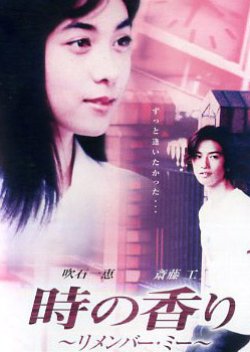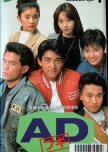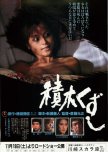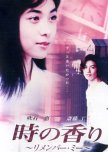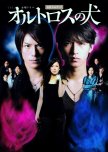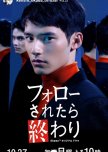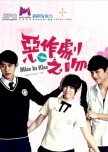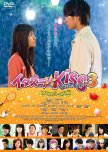
Miho, a high school student, refuses to approve of her widowed mother's potential husband when they meet each other at a restaurant. As she flounces out of the restaurant, she drops her cell phone. At the moment there is an earthquake, and she drops her cell phone down a staircase. The phone is found by Tokijiro, a boy that lives in 1912
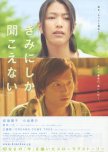
Directed by Hagishima Tatsuya, Kimi ni Shika Kikoenai (a.k.a. Calling You) is based on the same-titled light novel series by popular writer Otsuichi. Like Otsuichi's Waiting in the Dark, which was also recently adapted for the big screen, Kimi ni Shika Kikoenai revolves around two lonely young people who find each other in an uncommon manner. Shy, quiet, and unsure of herself, Aihara Ryo doesn't quite fit in anywhere. Though she wants to make friends, she has trouble speaking up and holding a normal conversation like everyone else. It seems that whenever she talks, the words just don't come out correctly. Gradually, Ryo has gotten used to living life in silence as a lonely and introverted student. With no one to talk to, Ryo also has no need for a cell phone. Longing for friends to talk to, she creates a cell phone in her mind for imaginary phone conversations, and much to her surprise, one day Shinya picks up on the other side. For the first time in her life, Ryo has found someone she can talk to.

Miho, a high school student, refuses to approve of her widowed mother's potential husband when they meet each other at a restaurant. As she flounces out of the restaurant, she drops her cell phone. At the moment there is an earthquake, and she drops her cell phone down a staircase. The phone is found by Tokijiro, a boy that lives in 1912

Directed by Hagishima Tatsuya, Kimi ni Shika Kikoenai (a.k.a. Calling You) is based on the same-titled light novel series by popular writer Otsuichi. Like Otsuichi's Waiting in the Dark, which was also recently adapted for the big screen, Kimi ni Shika Kikoenai revolves around two lonely young people who find each other in an uncommon manner. Shy, quiet, and unsure of herself, Aihara Ryo doesn't quite fit in anywhere. Though she wants to make friends, she has trouble speaking up and holding a normal conversation like everyone else. It seems that whenever she talks, the words just don't come out correctly. Gradually, Ryo has gotten used to living life in silence as a lonely and introverted student. With no one to talk to, Ryo also has no need for a cell phone. Longing for friends to talk to, she creates a cell phone in her mind for imaginary phone conversations, and much to her surprise, one day Shinya picks up on the other side. For the first time in her life, Ryo has found someone she can talk to.
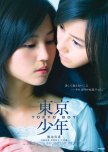
Minato is a young girl who was traumatized at a young age by being abandoned by her parents and left with her senile grandmother. She frequently corresponds with a pen-pal named Night, a boy about the same age as her that she's never actually seen in person. Although Minato and Night are very different - Minato is upbeat while Night is brooding, they get along anyway and she regularly updates him on the happenings in her daily life. Minato is even willing to confide in Night that she's falling in love with a boy she's recently met named Sho.
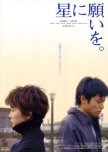
Shogo is left blind and mute from an accident but he is able to live a fruitful life as a composer. He receives ongoing therapy from the hospital where nurse Kana works. Just when their relationship is about to blossom into romance, tragedy strikes when Shogo is killed in a car accident. At the moment of Shogo's death, a shooting star falls and gives him the chance to live again for four more days. But he is unrecognizable to his friend and forbidden to reveal his true identity. Shogo decides to express his feelings of affection to Kana.
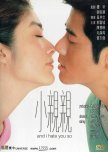
The third collaboration between Kelly Chan and Aaron Kwok yields probably their best pairing, though not their best film by far. Luna Ng is a popular newspaper columnist who makes an enemy of DJ Cheung Yung when she attempts to block his purchase of a used vinyl record. Cheung Yung is a lover of old vinyl and uses them on his popular radio show, where he plays old tunes and sometimes gives ill-advised romantic advice. Luna wanted that record because it was a gift to her first love and the shock and dismay over seeing it in a used bin cause her to wish to possess it again. The two begin to spar, she in her column and he on his radio show.
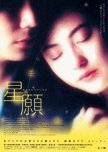
A summer hit in HK, this romantic fantasy from Jingle Ma is shamelessly manipulative, incredibly cheesy, and totally sappy. It goes to extreme lengths to yank your chains and push your buttons...and it works. Amazingly, this manufactured piece of sap is also an entertaining, compelling movie. An HK version of Ghost and Always, Fly Me to Polaris stars Richie Ren as Onion, a blind-mute who’s in love with his nurse Autumn (Cecilia Cheung). Before any feelings can be exchanged, he dies in a Meet Joe Black kinda way and proceeds to win a celestial contest. This flimsy plot device states he can have one wish - which he uses to live again. They deny him that, but give him the opportunity to return for one week.
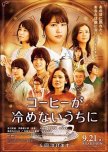
Kazu Tokita works at the cafe “Funiculi Funicula,” which is run by her relative Nagare Tokita. A mysterious rumor about the cafe has been spread that if a customer takes a specific seat at the cafe, that customer can travel back to a time of their choice. The specific rules for going into the past are: 1) You can't meet people who haven't visited the café. 2) If you do something different in the past, it won't change the present. 3) Only one seat in the café is able to take someone into the past and if the seat is occupied, you have to wait until the customer leaves. 4) When you go back into the past, you stay in the seat. 5) The time you can stay in the past is until the moment the coffee gets cold. 4 miracles take place at the café.

It all started when Takashi, a talented composer who could not write a love song ever since his girlfriend Rina left him suddenly, accidentally sent an incomplete piece of his latest work to Amane via email. Deeply touched by his music, Amane wrote back to him, without getting a reply. Amane continued writing to him, pouring out her thoughts. Only when she signed as "Teru Teru Bozu", did Takashi responded with a mail saying "WHO ARE YOU?", because what Rina left him as a farewell gift was a teru teru bozu!
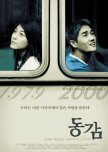
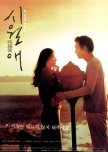

College freshman Si Ying gets a part-time job at “Cafe. Waiting. Love” coffee shop, where she befriends Abusi, a tomboyish barista who can make any coffee the customers request, the beautiful and mysterious cafe owner, and Zeyu, the boy who always sits in the same spot in the cafe who seems to be very popular with girls and on whom Si Ying develops an instant crush.

A drama about young adults and the importance of text messaging on their love lives. In the drama, Han Seung Ho is a Korean foreign student who moves in with, Miu, his friend. Han Seung Ho wants to send a message to his first love in Japanese, but because his Japanese is weak, he enlists the help of Miu to write the texts. Through this relationship, the two end up in love.


